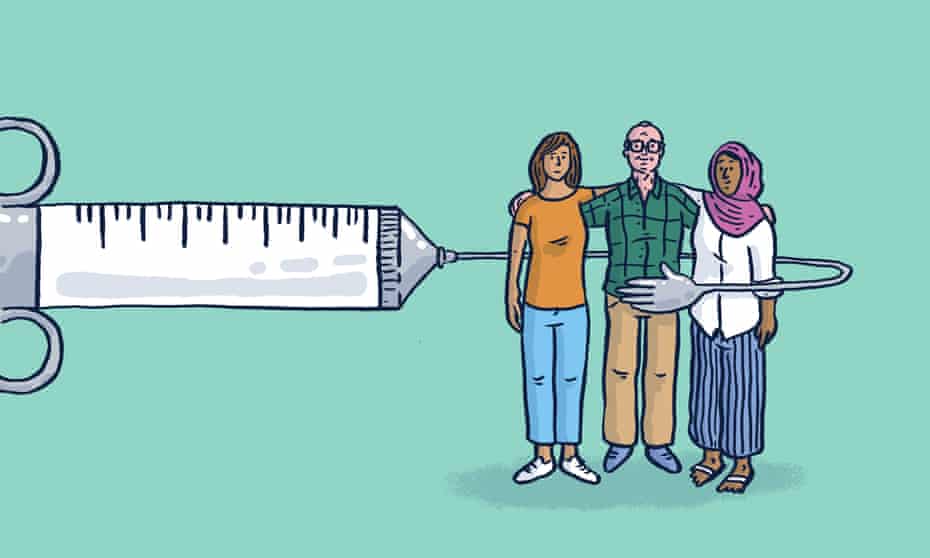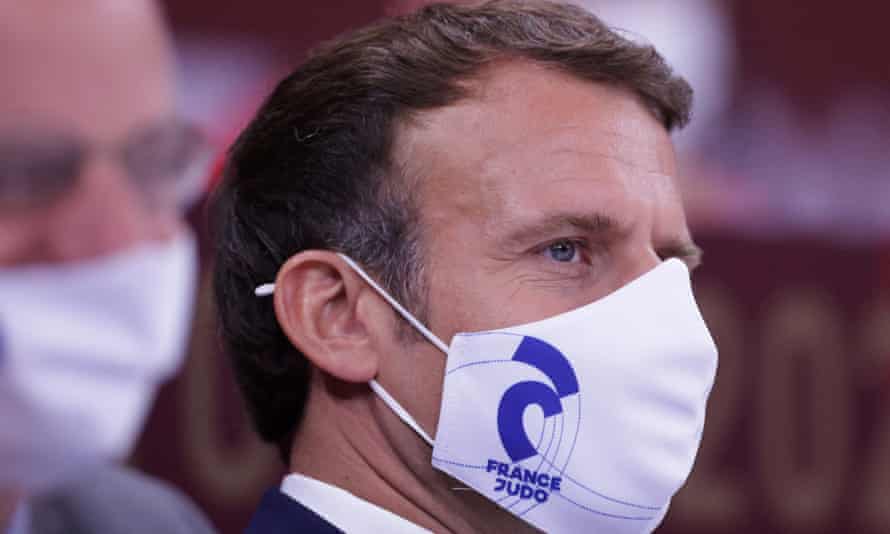Anti-vaxxers in France and elsewhere claim personal freedom. But what of brotherhood?

Illustration by Dominic McKenzie. Illustration: Dominic McKenzie/The Observer
Sun 15 Aug 2021
In France over the past few weeks, the topic of vaccine passports has induced an avalanche of outrage. Opposition to the measure has united both the hard left and right, with more than 200,000 people taking to the streets to express their contempt. In the kaleidoscope of disparate groups involved, the only unifying banner is the assertion that Emmanuel Macron’s policy is an infringement of the French tenet of liberté.
Nor is France unique in facing such resistance. In the United States, mask and vaccine mandates have generated passionate opprobrium and legal action.
Those resolutely opposed to anything styled as a vaccination passport tend to frame the issue as a solely personal choice. That can seem superficially reasonable but it highlights a crucial misunderstanding – a presumption that vaccination is solely an individual boon. On the contrary; immunisation is, at heart, a public health measure, implemented to reduce incidence and burden of disease at a population level. That it has huge individual benefit is undeniable but viewing vaccination through this reductive, individualistic lens fundamentally distorts the reality that it is about much more than protecting oneself.
Immunisation collectively reduces reservoirs for disease, providing a firewall that protects vulnerable members of society. While a Covid infection might not do a young, healthy person lasting harm, their passing on that infection could inflict substantial, even fatal, damage to vulnerable people.
This is a consideration frequently missed in the arguments about proof of vaccination in public spaces. Those decrying it as an infringement of their liberties fail to realise that others have a reasonable expectation that they should not be needlessly exposed to a potentially deadly virus if it can be avoided.
The libertarian argument fails on another level too – unvaccinated populations still pose a threat even to the vaccinated. Apart from the fact that vaccines do not have perfect efficacy, viruses mutate with reproduction. The unimmunised, in effect, constitute a mass of human petri dishes, where mutations endowed with capacity to evade the protection afforded by vaccination swiftly arise. The reduced effectiveness of vaccination against the Delta variant is a telling reminder of this reality.
Individual rights are not absolute and must be balanced with the freedoms of others
How we proceed then is a challenging question. We can simultaneously acknowledge that individual rights exist, but also acknowledge that rights are not absolute and must be balanced with the freedoms of others. Very few of us would object to the imposition of speed limits on a shared public road or to restrictions on smoking in public places, given the recognition that these activities can harm others.
The concept of communal vaccination rests on the same principle. It is worth noting that these debates are certainly not new. In England and Wales, the Vaccination Act of 1853 mandated universal vaccination against smallpox, with fines levied on those who opted not to comply. Such was the virulence of smallpox that vaccine mandates for schools were introduced in several US states as early as 1827.
It’s also worth noting that, while these measures were extraordinarily effective at reducing infection, they too were lambasted by opponents as medical despotism. Such charges have modern echoes in the slew of recent legal challenges against vaccine mandates. In one US case last week, Judge Frank H Easterbrook upheld Indiana University’s right to mandate vaccination for returning students. Ruling that a university has the right to decide the measures necessary to keep other students safe in congregate settings, Easterbrook noted: “Vaccination protects not only the vaccinated persons but also those who come in contact with them and at a university close contact is inevitable.”
Notably, this judgment relied on a 1905 supreme court decision, Jacobson v Massachusetts, which determined that states may require members of the public to be vaccinated against smallpox or risk being fined, a case motivated by the same “liberty” canard.

President Emmanuel Macron has told the French people that with freedom comes responsibility. Photograph: Hannah McKay/Reuters
Context is critical too. Even before the advent of Covid, anti-vaccine propaganda online had led to a deadly renaissance of diseases that were once virtually eradicated worldwide. Vaccine hesitancy is a spectrum and anti-vaccine activists had proved adept at weaponising social media to terrify parents. In 2019, endemic resurgence of measles forced the World Health Organization to declare vaccine hesitancy a top 10 threat to public health.
Anti-vaccine activists, galvanised by the pandemic, have made the invocation of liberty a central theme of their messaging. One especially ugly, historically illiterate stunt is their appropriation of the yellow star used to stigmatise Jews under Nazi Germany, claiming that they’re being similarly segregated from society for their beliefs. Quite aside from being staggeringly tone deaf, this is a deplorable false equivalence.
Vaccine certification seems a reasonable requirement for communal activities and one with historical pedigree, especially when the only barrier is misguided ideological opposition. But perhaps the most pertinent issue is whether vaccine passports can help banish the spectre of the pandemic.
Despite the sound and fury, the data from France is extremely promising. The government announcement that full vaccination would be required to enter public spaces caused a massive rise in vaccination uptake in the formerly vaccine sceptical nation. This is a vital observation, as it suggests much of the apathy was owing to complacency and laissez-faire contrarianism rather than some deep-seated opposition. While those protesting might be vocal, they are very much a minority. Macron’s move, for all the vitriol against it, was probably well judged.
Vaccines remain our best hope and there are still important conversations to be had on how we most effectively and fairly maximise uptake for everyone and what form mandates and incentives should take. However, one thing is sure – vaccination goes far beyond the individual and choices made have inescapable societal impact. Ultimately, those who would invoke the liberté of the French national motto as their mantra against vaccination betray themselves when they omit the equally vital fraternité.
Context is critical too. Even before the advent of Covid, anti-vaccine propaganda online had led to a deadly renaissance of diseases that were once virtually eradicated worldwide. Vaccine hesitancy is a spectrum and anti-vaccine activists had proved adept at weaponising social media to terrify parents. In 2019, endemic resurgence of measles forced the World Health Organization to declare vaccine hesitancy a top 10 threat to public health.
Anti-vaccine activists, galvanised by the pandemic, have made the invocation of liberty a central theme of their messaging. One especially ugly, historically illiterate stunt is their appropriation of the yellow star used to stigmatise Jews under Nazi Germany, claiming that they’re being similarly segregated from society for their beliefs. Quite aside from being staggeringly tone deaf, this is a deplorable false equivalence.
Vaccine certification seems a reasonable requirement for communal activities and one with historical pedigree, especially when the only barrier is misguided ideological opposition. But perhaps the most pertinent issue is whether vaccine passports can help banish the spectre of the pandemic.
Despite the sound and fury, the data from France is extremely promising. The government announcement that full vaccination would be required to enter public spaces caused a massive rise in vaccination uptake in the formerly vaccine sceptical nation. This is a vital observation, as it suggests much of the apathy was owing to complacency and laissez-faire contrarianism rather than some deep-seated opposition. While those protesting might be vocal, they are very much a minority. Macron’s move, for all the vitriol against it, was probably well judged.
Vaccines remain our best hope and there are still important conversations to be had on how we most effectively and fairly maximise uptake for everyone and what form mandates and incentives should take. However, one thing is sure – vaccination goes far beyond the individual and choices made have inescapable societal impact. Ultimately, those who would invoke the liberté of the French national motto as their mantra against vaccination betray themselves when they omit the equally vital fraternité.

Dr David Robert Grimes, a physicist and cancer researcher, is the author of The Irrational Ape: Why We Fall for Disinformation, Conspiracy Theory and Propaganda
No comments:
Post a Comment